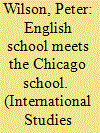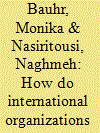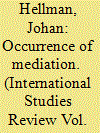| Srl | Item |
| 1 |
ID:
117453


|
|
|
|
|
| Publication |
2012.
|
| Summary/Abstract |
The concept of primary international institutions is a core idea of the English School and central to those scholars from Bull to Buzan who have sought to take it in a more sociological direction. Yet the English School has traditionally found it difficult to define and identify with consistency the institutions of international society. A group of scholars, here called the "new institutionalists," have recently sought to address this problem by devising tighter definitions and applying them more rigorously. But different understandings and lists of institutions continue to proliferate. The source of the problem is the reliance on "stipulative" definitions, drawn from an increasingly abstract theoretical literature. The problem is compounded by the new institutionalists' employment of social structural and other "outsider" methods of social research. This article argues that it is only possible to empirically ground institutions, a task on which all agree, by returning to the interpretive "insider" approach traditionally associated with the school-but employing it in a much more rigorous way. To this end it makes the case for a "grounded theory" of international institutions inspired by Chicago School sociology.
|
|
|
|
|
|
|
|
|
|
|
|
|
|
|
|
| 2 |
ID:
117452


|
|
|
|
|
| Publication |
2012.
|
| Summary/Abstract |
How do international organizations (IOs) promote quality of government (QoG) and reduce corruption? IOs play a central role in most accounts of power in international relations. However, our understanding of how IOs exercise power seldom moves beyond the traditional material-normative dimensions of power. We suggest that an important dimension to understand IO power is the contestation-integration dimension, where IOs can exercise power either by integrating countries into networks of cultural exchange or by contesting existing orders. By analyzing multilateral aid data and building on recent advances in our understanding of the effectiveness of IO anti-corruption work, we apply this framework to show how the contestation-integration dimension helps us understand the success or failure of anti-corruption strategies. We show that when IOs contest existing orders using governance rankings and aid conditionality, they suffer from ideational shortcomings, including lack of objective data and contested policy advice. In contrast, measures based on integration, such as the membership process of IOs or interaction with IOs, are more likely to suffer from internal procedural shortcomings, such as IOs failing to internalize and mainstream the norms that they seek to promote. Our findings have implications for both understanding conditions that limit the diffusion of the international anti-corruption agenda and advancing our knowledge of IO power and its limits.
|
|
|
|
|
|
|
|
|
|
|
|
|
|
|
|
| 3 |
ID:
117454


|
|
|
|
|
| Publication |
2012.
|
| Summary/Abstract |
Scholars of international mediation have paid insufficient attention to the determinants of mediation incidence. This is unfortunate, since a better understanding about what circumstances promote mediation occurrence would be of great benefit to other branches of the field, as, for example, mediation efficiency evaluation. This literature review addresses this topic, reviews the current literature, evaluates and problematizes some core concepts and assumptions, and suggests ways forward. It especially emphasizes the critical need of approaching the theoretical debates of international relations to provide a more solid base for mediation studies, and to enrich the field with studies that explore the potentials of a plurality of theoretical perspectives.
|
|
|
|
|
|
|
|
|
|
|
|
|
|
|
|
| 4 |
ID:
117451


|
|
|
|
|
| Publication |
2012.
|
| Summary/Abstract |
Enforcement of agreements can be a major challenge in international politics. However, the interest in mechanisms of self-enforcement seems significantly lower among scholars studying international peace agreements (IPAs) than among scholars studying international environmental agreements (IEAs). Moreover, practically no exchange of ideas and findings about enforcement can be found between these two fields of research. We argue that a combination of similarities and differences between the two issue-areas provides fertile ground for mutual learning. To facilitate communication we develop a unifying but differentiated definition of self-enforcing agreements (SEAs). We then use this conceptual framework to explore lessons about IEA design that might be learned by studying IPAs and lessons about IPA design that might be learned by studying IEAs. We submit that this kind of compare-and-contrast analysis may provide important input for the development of a more refined and general theory of SEAs.
|
|
|
|
|
|
|
|
|
|
|
|
|
|
|
|
| 5 |
ID:
117450


|
|
|
|
|
| Publication |
2012.
|
| Summary/Abstract |
Structural theories have advanced our understanding of International Relations (IR). This article contends that the two leading structural realist frameworks, however, rely too heavily on an ascribed unit motivation and core dynamic that are not derived from structure. This ultimately weakens both theories' explanatory potential. This article offers a refinement called structural autonomy that explains IR through a focus on a self-reliant pursuit of autonomy and the particular distribution of capabilities found across the system.
|
|
|
|
|
|
|
|
|
|
|
|
|
|
|
|